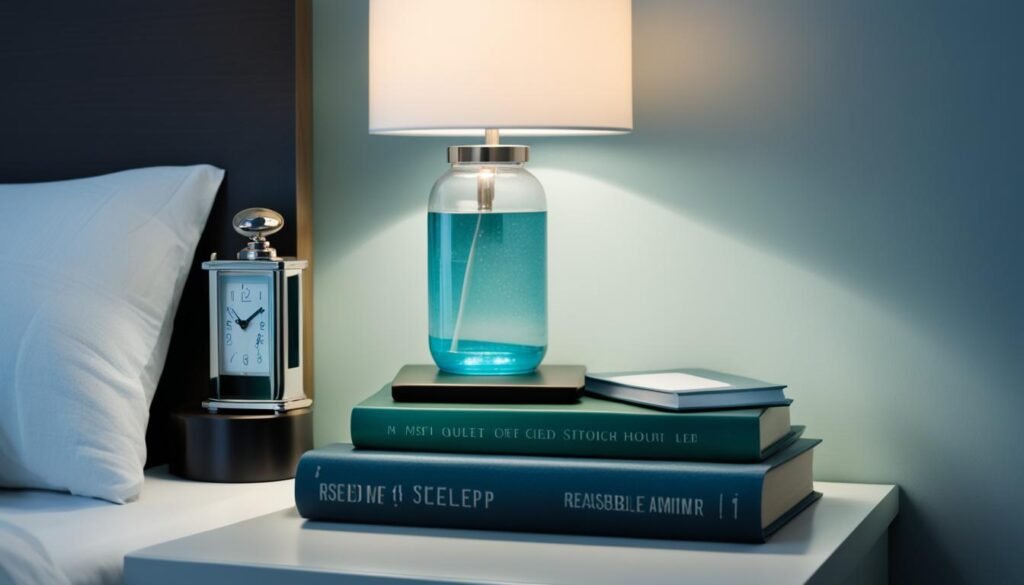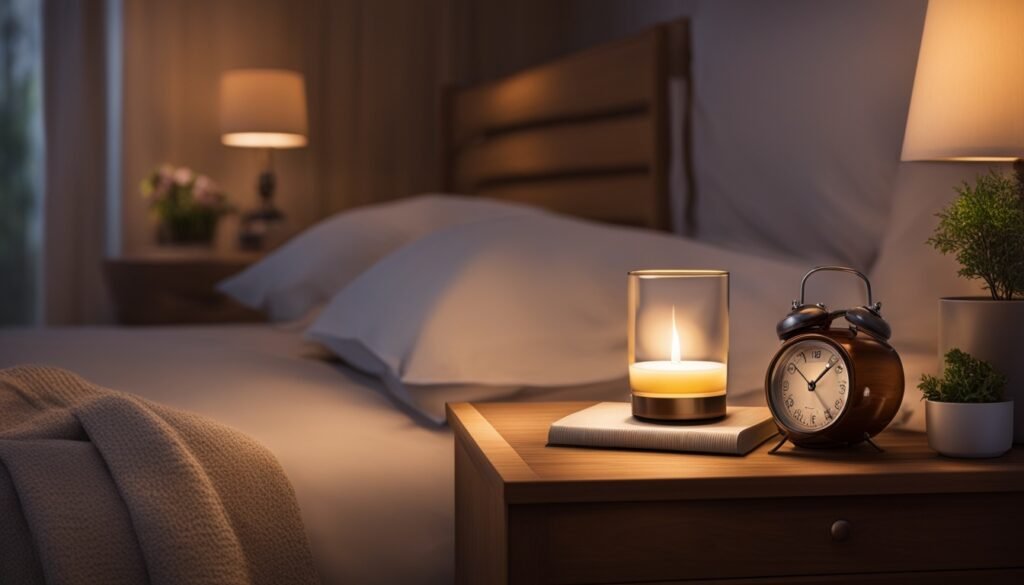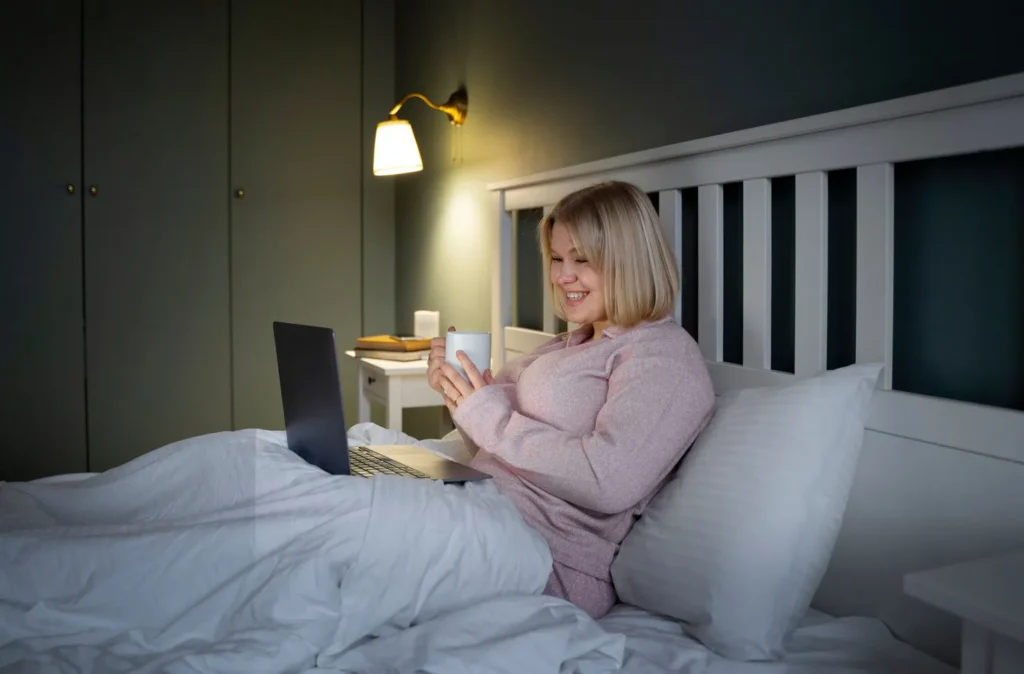As the sun sets, many of us struggle to relax and get the sleep we need. Work demands, screen time, and racing thoughts keep us awake. But a consistent bedtime routine can change that. It can make you feel refreshed and rejuvenated.
This article will cover the top 10 bedtime routines for adults. These routines can improve sleep quality, reduce stress and anxiety, and help with sleep hygiene. We’ll share expert tips and strategies for better sleep.

Key Takeaways
- Establishing a consistent bedtime routine can significantly improve sleep quality and overall well-being.
- Incorporating relaxation techniques, such as deep breathing and progressive muscle relaxation, before bed can help reduce stress and anxiety.
- Creating a sleep-friendly environment, with comfortable bedding and limited exposure to blue light, can promote better sleep hygiene.
- Gentle movement and stretching, paired with mindfulness and meditation, can further enhance the restorative power of your bedtime routine.
- By combining these proven strategies, you can experience the transformative benefits of better sleep and feel refreshed and energized.
The Importance of a Solid Bedtime Routine
Creating consistent, healthy sleep habits is critical for adults to get good sleep and handle stress and anxiety. A good pre-sleep routine helps your body’s natural sleep cycle, makes you relax, and eases you into deep sleep.
Improving Sleep Quality
Starting a sleep hygiene routine can improve sleep. This might mean cutting screen time before bed, keeping your bedroom cool and dark, and skipping caffeine and big meals before sleep.
Reducing Stress and Anxiety
A regular bedtime routine is excellent for stress management. Relaxing activities like reading, stretching, or deep breathing can calm your mind and body, making it easier to fall asleep and stay asleep all night.
“A good night’s sleep is key for your health. Making a solid bedtime routine is a top way to better your sleep and handle stress.”
Adding these tips to your daily life helps you work towards better healthy sleep habits and overall health.
Best Bedtime Routines for Adults
Creating a bedtime routine is critical for adults wanting better sleep and well-being. It includes making your bedroom sleep-friendly and using gentle movements and mindfulness. We’ll look at science-based routines to help you relax and get ready for sleep.
First, make your bedroom sleep-ready. This means dimming lights, setting the right temperature, and reducing noise and screen time. Activities like reading, warm baths, or herbal tea signal bedtime to your body.
Adding gentle movement to your routine is also good. Restorative yoga poses or a calm walk can ease your body for sleep. Mindfulness and meditation can lower stress and anxiety, making it easier to fall asleep.
| Bedtime Routine Element | Benefits |
|---|---|
| Creating a sleep-friendly environment | Promotes relaxation and better quality sleep |
| Incorporating gentle movement and stretching | Reduces physical tension and prepares the body for rest |
| Practicing mindfulness and meditation | Decreases stress and anxiety, facilitating a more restful state |
Try different calming bedtime rituals and add them to your pre-sleep routine. This can make bedtime more consistent and relaxing. It leads to better bedtime routines for adults and overall health.
“A good night’s sleep is essential for physical, mental and emotional health. Establishing a consistent bedtime routine can make a significant difference in the quality of your sleep and your ability to function at your best the next day.”
Establish a Consistent Sleep Schedule
Keeping a regular sleep pattern is vital to good sleep habits. A steady sleep schedule significantly improves our healthy sleep habits and sleep hygiene. Going to bed and waking up at the same time daily helps our body clock work better, leading to better sleep quality and length.
Here are some tips to help adults keep a steady sleep schedule:
- Set a fixed bedtime and wake-up time, even on weekends. Consistency is key.
- Avoid staying late or sleeping in, which can disrupt your body’s natural rhythm.
- Create a relaxing pre-bed routine, such as taking a warm bath, reading a book, or practicing light stretching, to signal your body that it’s time to wind down.
- Limit blue light from electronic devices before bed. It can lower melatonin production, a hormone that helps regulate sleep.
- Try to get 7-9 hours of sleep each night, which most adults need.
Sticking to a regular sleep schedule can enhance sleep quality, reduce stress and anxiety, and make us feel more awake and refreshed. Maintaining healthy sleep habits and hygiene can also improve our well-being.

| Benefit | Description |
|---|---|
| Improved Sleep Quality | A consistent sleep schedule helps regulate the body’s circadian rhythm, leading to deeper, more restorative sleep. |
| Reduced Stress and Anxiety | Sticking to a regular sleep cycle can lower stress and ease anxiety, helping our mental health. |
| Increased Energy and Productivity | Sleeping 7-9 hours each night refreshes and energizes us, which boosts our productivity and performance during the day. |
Practice Relaxation Techniques
Adding relaxation techniques to your bedtime routine can improve stress management and sleep quality. These simple practices calm the mind and body, making it easier to fall asleep. Let’s look at two great techniques tonight: deep breathing exercises and progressive muscle relaxation.
Deep Breathing Exercises
Deep breathing is a solid way to reduce anxiety and relax. Start by getting comfy, either sitting or lying down. Breathe deeply through your nose, letting your belly expand. Hold it for a bit, then breathe out slowly through your mouth. Keep doing this, focusing on your breath’s rhythm. With time, this can lower your heart rate and blood pressure, helping you sleep better.
Progressive Muscle Relaxation
- Start by tensing your toes, holding for a few seconds, then releasing.
- Move up your body, tensing and releasing each muscle group from toes to head.
- Notice how tension and relaxation feel in each muscle.
- As you go, your body will release more stress and strain.
These relaxation techniques before bed can help manage stress and improve sleep. Try them out and see how they can improve your sleep.

Unwind with a Calming Bedtime Ritual
Creating a soothing pre-sleep routine can change how you wind down and get ready for sleep. Adding calming bedtime rituals to your day can tell your mind and body it’s time to relax and sleep.
Herbal Tea and Light Reading
Enjoying a warm herbal tea is a simple way to relax before bed. Drinking a calming tea, like chamomile or lavender, can physically and mentally soothe you. Add some light reading to the mix, like a fiction novel or an interesting article.
This combination of a warm drink and gentle reading can calm your mind and body and prepare you for a deep, restful sleep.
- Brew a cup of herbal tea, such as chamomile or lavender, to help you relax
- Engage in light reading, such as a few pages from a book or a short article
- Avoid stimulating activities like scrolling through social media or watching intense TV shows
Adding these calming bedtime rituals to your routine tells your body it’s time to wind down. This can improve your sleep quality and overall well-being.

Create a Sleep-Friendly Environment
Making your sleep area comfy is critical to getting good sleep. Think about these things to help your sleep get better:
Lighting
Light from devices like phones can interfere with your sleep cycle. Turn down the lights in your bedroom before bed, and try not to use your phone, tablet, or computer right before sleep.
Temperature and Ventilation
The best bedroom temperature is between 65°F and 70°F (18°C and 21°C). Make sure your room has good airflow. You might want a fan or air conditioner to keep it comfy.
Noise and Distractions
Less noise and distractions can improve sleep. Use earplugs, white noise machines, or a sound machine to block out loud sounds. Also, keep your bedroom tidy and free from things that might distract you.
Bedding and Mattress Quality
Get a mattress and bedding that feels good and supports your body. To keep it fresh, change your mattress every 7-10 years.
| Factor | Recommendation |
|---|---|
| Lighting | Dim lights an hour before bedtime, avoid blue-wavelength light |
| Temperature and Ventilation | Maintain a bedroom temperature between 65°F and 70°F (18°C and 21°C), ensure proper ventilation |
| Noise and Distractions | Use earplugs, white noise machines, or sound machines to block external noise and keep the bedroom free from clutter and electronic devices. |
| Bedding and Mattress Quality | Invest in a comfortable, supportive mattress and high-quality bedding, and replace the mattress every 7-10 years. |
Focusing on these areas can improve your sleep space, helping you sleep well and feel refreshed in the morning.
Incorporate Gentle Movement and Stretching
Gentle movement and stretching before bed can improve sleep. Adding bedtime yoga poses to your routine helps release tension, calms the mind, and prepares you for better sleep.
I recommended the Exercise Yoga Mat with Carrying Strap on Amazon.
Restorative Yoga Poses
Restorative yoga is perfect for unwinding before sleep. It focuses on deep relaxation and gentle stretches. Here are some poses to try:
- Child’s Pose: This pose eases back, shoulder, and neck tension. Kneel with knees wide apart and big toes touching. Fold forward, resting your forehead on the mat and stretching your arms out.
- Reclined Bound Angle Pose: Lie on your back with feet together and knees out to the sides. This pose opens the hips and reduces stress, promoting relaxation techniques.
- Legs-up-the-Wall Pose: Extend your legs up against a wall. This pose improves circulation and soothes the nervous system.
Try these poses for 5-10 minutes before bed. Gentle movement and stretching help you feel calm, preparing you for a peaceful night’s sleep.
Mindfulness and Meditation for Better Sleep
Many adults struggle with getting good sleep. But adding mindfulness and meditation to your bedtime can change that. These methods are great at handling stress and anxiety, which often disrupt sleep.
Mindfulness means being fully in the moment. It helps stop racing thoughts that keep you awake. By watching your thoughts and feelings without judging them, you can feel calm and ready for sleep.
Meditation is a way to calm your mind and prepare for sleep. Simple breathing exercises or guided meditations can help you forget about the day’s stress, making you more peaceful and ready for sleep.
The Benefits of Mindfulness and Meditation for Sleep
- Reduces stress and anxiety, two common barriers to quality sleep
- Enhances overall sleep quality and duration
- Promotes a sense of calm and relaxation before bedtime
- Improves sleep-related cognitive function, such as memory and focus
Incorporating Mindfulness and Meditation into Your Bedtime Routine
Adding mindfulness and meditation to your bedtime can be easy. Just set aside 10-15 minutes each night for it. Start with a guided meditation, or try the 4-7-8 breathing exercises. Breathe for 4 seconds, hold for 7, and breathe out for 8.
It’s essential to find what works for you and stick with it. With time and effort, meditation for sleep and stress management could become necessary for better sleep.
Conclusion
In this article, we examined the best bedtime routines for adults and discussed how to improve sleep habits. This includes setting a regular sleep schedule, relaxing before bed, and making your bedroom sleep-friendly.
These expert tips can help you handle stress and anxiety better. They can also improve your sleep quality and help you have a healthy sleep-wake cycle. Try out different bedtime routines to see what suits you best.
Getting enough sleep is vital to feeling good overall. Focusing on your sleep health can offer many benefits, including better thinking skills and physical and emotional strength. Start these healthy sleep habits for a more restful and refreshing sleep each night.
FAQ
What are the benefits of establishing a consistent bedtime routine?
A consistent bedtime routine can boost sleep quality and reduce stress. It helps us wake up feeling refreshed, aligns our body’s natural sleep cycle, and makes us more relaxed before bed.
What are some of the best bedtime routines for adults to try?
Adults can try creating a sleep-friendly environment and practicing relaxation techniques. These include deep breathing and progressive muscle relaxation. Gentle movement, stretching, mindfulness, and meditation are also great options.
Why is it essential to maintain a consistent sleep schedule?
Keeping a regular sleep-wake cycle is critical to a good bedtime routine. Sticking to set bedtimes and waking times helps our body clock, which improves our sleep quality.
How can relaxation techniques help with bedtime routines?
Relaxation techniques like deep breathing and progressive muscle relaxation calm the mind and body. They reduce stress and anxiety, making it easier to sleep well.
What are the benefits of creating a calming bedtime ritual?
Like drinking herbal tea and reading, a calming bedtime ritual tells our body it’s time to sleep. This helps us relax and prepare for a good night’s rest.
How can a sleep-friendly environment improve our bedtime routines?
Adjusting lighting, temperature, and noise levels is crucial for creating a sleep-friendly bedroom. These factors significantly affect sleep quality and the effectiveness of our bedtime routine.
What gentle movement and stretching exercises can be incorporated into a bedtime routine?
Restorative yoga poses and gentle movements help release tension, making relaxing and preparing for sleep easier.
How can mindfulness and meditation practices improve our bedtime routines?
Mindfulness and meditation help manage stress and anxiety, which improves sleep quality. Adding these to our bedtime routine helps us relax and get ready for sleep.
Please note: This article is not intended to serve as medical advice. Always consult a healthcare professional before starting any new sleep treatments or routines. Additionally, this post may contain affiliate links, which means I may earn a commission if you purchase through them at no extra cost.






